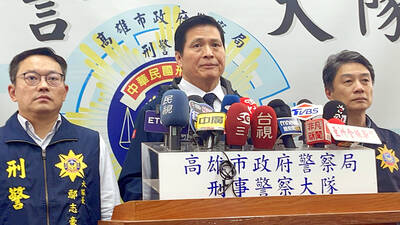It is possible that SARS will resurface in this country, but the chances of a major outbreak of the killer atypical pneumonia are slim given experience accumulated in fighting the disease, Academia Sinica's vice president said yesterday.
Taiwan's achievements over the past year in the research and development of anti-SARS vaccines, SARS treatment medication as well as SARS virus identifying techniques were commendable, researcher Michael Lai (賴明詔) said.
Lai, reputed to be the father of coronavirus research and who studied the virus for more than 20 years in the US before assuming his job in Taiwan, made the remarks during a speech entitled "The Challenges of Viruses to Modern Societies" at a regular monthly meeting at the President Office yesterday, which was presided over by President Chen Shui-bian (
Experiments on animals have shown that the coronavirus can survive in animals for several months without the animal showing any symptoms, Lai said, adding that the same situation might be true for humans.
This would mean that some people might be carrying the virus without developing the disease, but still be capable of spreading the disease to others, he said.
Genetic analyses conducted in China showed that at least three types of SARS viruses had "jumped" from different types of civets to humans over the past two years, Lai said, adding that this means that SARS viruses could jump to human beings again and again because SARS viruses are already "rooted" in civets.
Against this backdrop, Lai said, SARS could recur as long as the animals exist.
Although the virus can mutate over time, Lai said, it will not change too greatly, and the public can protect itself properly by following the precautionary measures worked out by health agencies in the country.
More than one year after Taiwan was battered by SARS, the country is better equipped and prepared for any war against the epidemic disease in the future, Lai said.

Twenty-four Republican members of the US House of Representatives yesterday introduced a concurrent resolution calling on the US government to abolish the “one China” policy and restore formal diplomatic relations with Taiwan. Led by US representatives Tom Tiffany and Scott Perry, the resolution calls for not only re-establishing formal relations, but also urges the US Trade Representative to negotiate a free-trade agreement (FTA) with Taiwan and for US officials to advocate for Taiwan’s full membership in the UN and other international organizations. In a news release announcing the resolution, Tiffany, who represents a Wisconsin district, called the “one China” policy “outdated, counterproductive

Actress Barbie Hsu (徐熙媛) has “returned home” to Taiwan, and there are no plans to hold a funeral for the TV star who died in Japan from influenza- induced pneumonia, her family said in a statement Wednesday night. The statement was released after local media outlets reported that Barbie Hsu’s ashes were brought back Taiwan on board a private jet, which arrived at Taipei Songshan Airport around 3 p.m. on Wednesday. To the reporters waiting at the airport, the statement issued by the family read “(we) appreciate friends working in the media for waiting in the cold weather.” “She has safely returned home.

TRUMP ERA: The change has sparked speculation on whether it was related to the new US president’s plan to dismiss more than 1,000 Joe Biden-era appointees The US government has declined to comment on a post that indicated the departure of Laura Rosenberger as chair of the American Institute in Taiwan (AIT). Neither the US Department of State nor the AIT has responded to the Central News Agency’s questions on the matter, after Rosenberger was listed as a former chair on the AIT’s official Web site, with her tenure marked as 2023 to this year. US officials have said previously that they usually do not comment on personnel changes within the government. Rosenberger was appointed head of the AIT in 2023, during the administration of former US president Joe

ON PAROLE: The 73-year-old suspect has a criminal record of rape committed when he was serving in the military, as well as robbery and theft, police said The Kaohsiung District Court yesterday approved the detention of a 73-year-old man for allegedly murdering three women. The suspect, surnamed Chang (張), was arrested on Wednesday evening in connection with the death of a 71-year-old woman surnamed Chao (趙). The Kaohsiung City Police Department yesterday also unveiled the identities of two other possible victims in the serial killing case, a 75-year-old woman surnamed Huang (黃), the suspect’s sister-in-law, and a 75-year-old woman surnamed Chang (張), who is not related to the suspect. The case came to light when Chao disappeared after taking the suspect back to his residence on Sunday. Police, upon reviewing CCTV